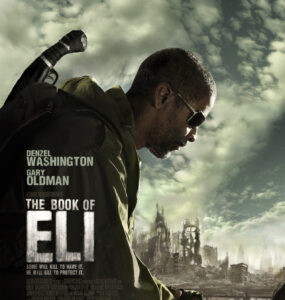The movie The Book of Eli is the story of a post-apocalyptic world in which humanity is reduced to anarchy and cannibalism.

Eli (played by Denzel Washington) is a man on a journey, guided by a voice, with the mission of protecting a mysterious book. The antagonist is Carnegie (played by Gary Oldman) who is looking for a single copy of the mysterious book. For Eli, the book symbolizes hope; for Carnegie, the book is a tool of power. Both men hold the Bible dear to their hearts. I found the movie to be a powerful commentary on the nature of humanity and Sacred Scripture.
Sadly, we must acknowledge that the Bible has sometimes been misused as a tool of power. This was demonstrated in Satan’s use of scripture to tempt Christ (Luke 4:9-11). The most recent example is that of Vladimir Putin, who has used religion, specifically the Russian Orthodox Church, to consolidate his tyrannical hold over Russia. In the history of the Americas, the Bible has been misused to justify slavery, genocide, colonialism, nationalism, racism, infanticide, and sexism. The misuse of sacred scripture to oppress (or subordinate) fellow humans, all created in the image of God, demonstrates the ability of fallen humans to pervert the truth of God’s word. Isaiah warned,
Woe to those who call evil good, and good evil; Who substitute darkness for light and light for darkness; Who substitute bitter for sweet and sweet for bitter! (5:20).
I must admit that I find the tendency to misuse scripture unremarkable. Humans have again and again demonstrated an uncanny ability to justify evil in the name of God.
What is remarkable to me is the ability of sacred scripture to speak words of life, blessing, and salvation in spite of human evil. The people of Israel questioned God’s power to provide in the midst of the wilderness.
Is the LORD’S power too little? Now you shall see whether My word will come true for you or not (Numbers 11:23).
Likewise, many question God’s grace as they consider the suffering, injustice, and violence of human history. However, it is the power of God’s grace in the midst of the wilderness of suffering and injustice that demonstrates the self-authenticating nature of sacred scripture. Those who encounter God’s grace, who are forgiven of sin, liberated from injustice, delivered from the powers of evil, nourished by God’s word, and triumph over death, can testify to the veracity of God’s word.
The irony of The Book of Eli is that the only ones who can see the nature of sacred scripture are those who are blind. When Carnegie succeeds in stealing the Bible from Eli, he discovers that he can’t read it because it’s a Braille edition – produced for blind persons in which raised dots represent the letters of the alphabet. Carnegie gives the Bible to his mistress, Claudia, who is blind (played by Jennifer Beals). As her fingers move over the words of Scripture, her facial expression reveals comfort and hope. Also, as the movie ends we discover that Eli is blind.
The irony of sacred scripture is that those who have been oppressed by its misuse have often been its best interpreters. Whereas, those in power tend to misread scripture, those who have been oppressed and humiliated can see and understand what others cannot. The Pharisees misinterpreted the Law and “shut the door of the Kingdom of Heaven in people’s faces” (Matthew 23:13 NLT). Even as white slave-owners (mis)quoted Paul, slaves heard the words of Jesus: “He has sent me to proclaim release to the captives” (Luke 4:18). Even as men have sought to keep women silent, women are empowered by the Holy Spirit to boldly speak (Acts 2:18). Even as some women have sought to exercise autonomy over their bodies, the silent screams of aborted children cry out like blood from the ground… “for the kingdom of God belongs to such as these” (Mark 10:14).
Sacred scripture is self-authenticating. Words of life and freedom leap from its pages. May God give us the grace to see beyond our sinful biases.
